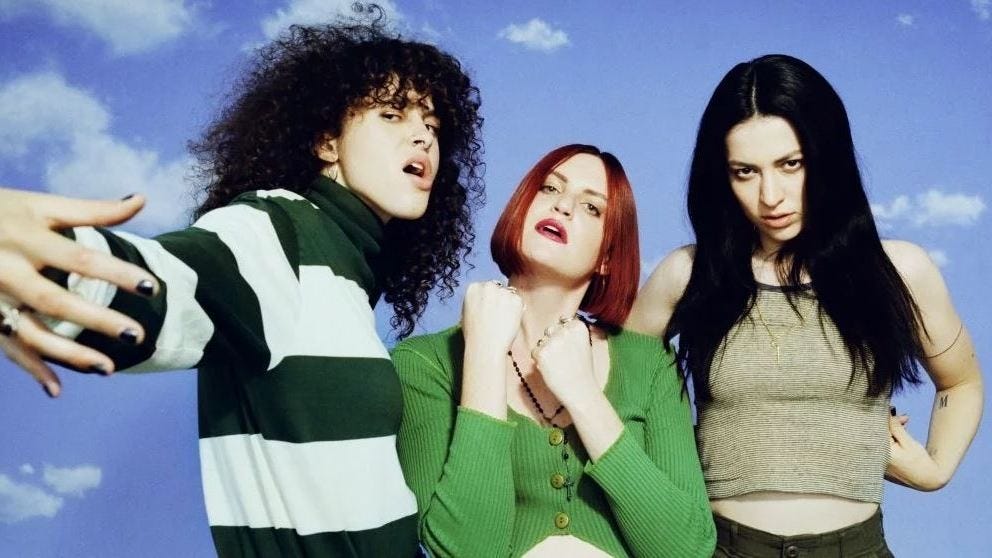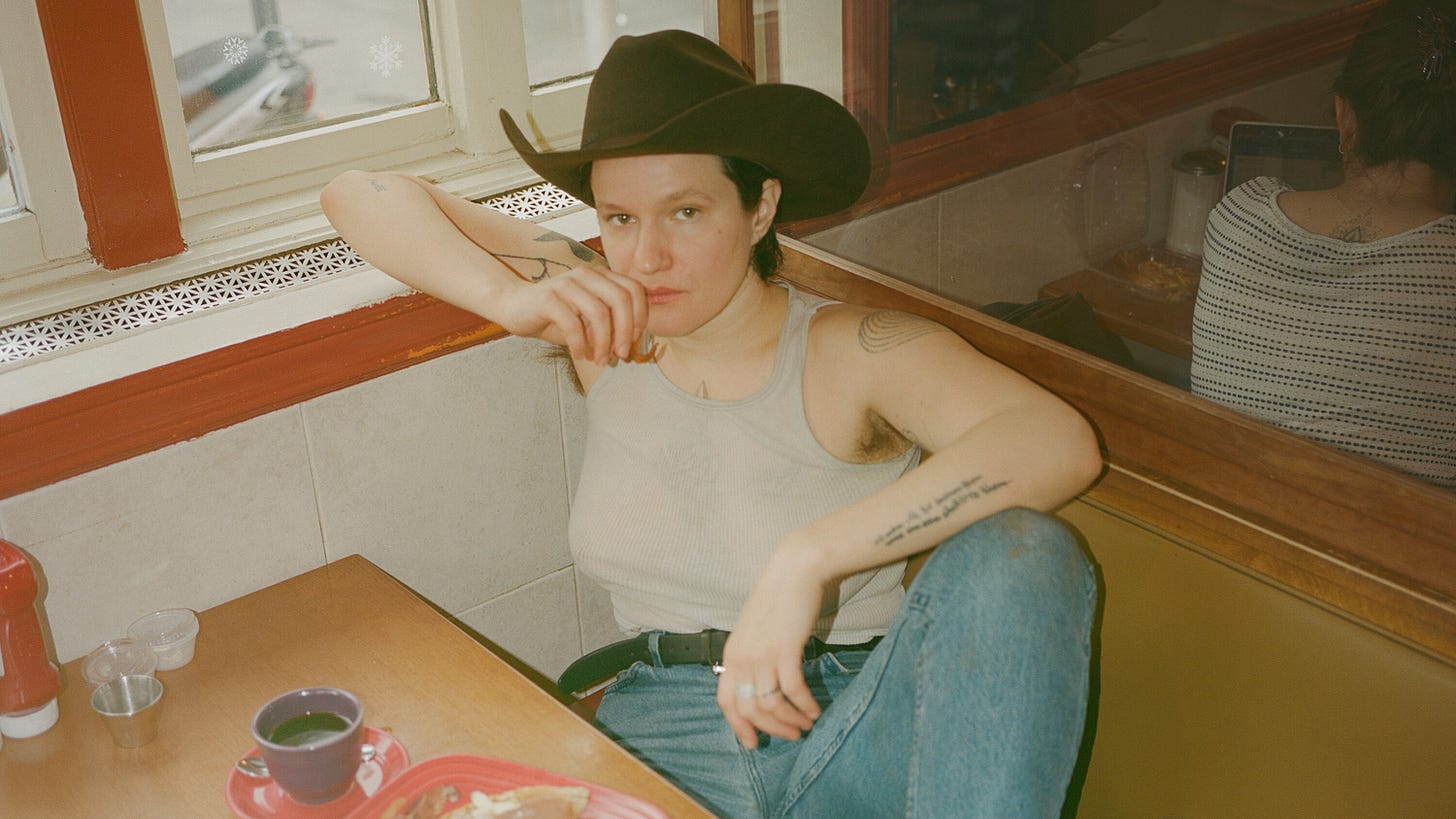The Songs of the Decade: "Silk Chiffon" / "anything"
On falling in love, being in love, and the big love. Also music, kinda.
While I’ve tried to maintain some critical distance between myself and the songs I’ve written about for this series, these two are so inextricable from both my personal musical sensibilities and the arc of my character development over the past five years that the best way I can think of to write about them is through memoir and metaphor.
Besides, it’s Valentine’s Day later this week, so what better way to get in the right mindset for all that than with a pair of treatises on romance?
Here’s the full playlist of the 100 Best Songs of the 2020s (So Far).
In case you missed any of our prior newsletters for this series so far:
Top 10 (all by me): “TLC Cagematch” / “Casual” | “American Teenager” / “People, I’ve been sad” | “Silk Chiffon” / “anything” | “Hard Drive” / “Somewhere Near Marseilles” | “It’s Not Just Me, It’s Everybody” / “Welcome to My Island”
Guests: “Starburned and Unkissed” by Gian Balangue | 3 K-Pop Songs by Justin Nava | “Huwag Muna Tayong Umuwi” / “The Loneliest Time” by Emil Hofileña | “My Love Mine All Mine” by Ashley Ranich | “Billions” by Niki Colet | “party 4 u” / “Will Anybody Ever Love Me?” by Currie McKinley
6. MUNA - “Silk Chiffon”
Depending on the definition, I have fallen in love anywhere between 8 and 50 times in my life. Some of those lasted for years, others for only a semester, and one or two for just the span of a conversation. It’s a designation I’ve gotten less precious about with age. My friend Currie likes to say that love, while always remarkable, isn’t a scarce resource; falling in love works in mostly the same way. Over time, I’ve learned it is just another thing the body (or at least, my body) does, hardly different from blinking or breathing.
Newton’s First Law of Motion states that a body at rest will remain at rest until an external force acts upon it. This tendency—as well as the associated initial resistance—would later come to be referred to as inertia. In everyday human life, inertia is often near-imperceptible; human bodies in motion are, for the most part, incapable of moving at the sort of speeds that might engender a more visceral reaction on their own. Before the relatively recent invention of cars and trains and flying machines, the only real way to cause that kind of physiological disorientation was free-fall.
Perhaps, then, that is why we call it falling in love. After all, to fall in love is to be abruptly launched from a place of rest into some unfamiliar new frontier, your insides scrambling to rearrange themselves in its wake. Suddenly, your heart is in your stomach, and your guts are tied up in a sloppily-done half-Windsor knot. Your lungs are now pressed up uncomfortably against the insides of your ribcage, and your throat cannot seem to turn air into words, it’s so discombobulated. It might feel like glitter is exploding inside of you, but really, it’s just another, more pleasant form of motion sickness. Your body adjusts, surrenders to this new trajectory, and becomes almost weightless. Suddenly, you are aerodynamic.
MUNA’s “Silk Chiffon” opens like a airplane pulling away from a terminal, unfurling its different elements—the low rumble of synths, a guitar riff alongside Katie Gavin’s lilting vocals (Sun down and I’m feeling lifted), and finally its propulsive, persistent drum beat—one by one as it picks up speed and gathers momentum. Our lovers meet, casually at first and then perhaps not so much. Life’s so fun, life’s so fun, Gavin repeats in the second verse, almost as if she were trying to convince herself of it: Don’t need to worry about no one. It reads like one last desperate plea for her heart to be still—one last iota of inertia at the threshold of the stratosphere.
“She said I got her if I want / She’s so soft, like silk chiffon.”
Then it hits escape velocity, erupting into a rapturous exclamation as it cuts through the clouds and, for the briefest of moments, touches ever so lightly against the base of heaven:
SILK! Chiffon*~
It’s a song about the euphoric, infinite potentiality of a light touch: The way a dress or a bag or the eyes of a lover can feel electric just brushing against your skin, even if it ends up as just a brush, because…it might not. Even as the song begins to layer in uncertainty (I’m high / And I’m feeling anxious) and doubt (Oh, why wouldn’t it be? / Oh, why wouldn’t it be?), it maintains that same soaring tenor, as if to say that those jitters in your heart are all part of the ride. Sure, the ecstasy in that potential doesn’t have too long a shelf life before it curdles into anxiety, but until it does—what a rush!
I am grateful for it every time, even if, out of the 8 to 50 times I’ve been in love, none of them ever turned into anything romantically sustainable. Some of them became beloved platonic friends, and others came and went too quickly for me to make a decision either way. One or two of them ended in genuine heartbreak, but no more than one or two. These days, I hardly think about most of them, but none of it was wasted time.
If for nothing else, I’ll always cherish their beginnings, when desire and possibility first blend into the jet fuel that ignites and combusts in the pits of the chest, and suddenly every imaginable altitude feels within reach, if only for that brief moment when gaze might meet gaze, and skin might meet skin.
It feels good to me. Oh, why wouldn’t it be?
5. Adrianne Lenker - “anything”
“I am the least difficult of men. All I want is boundless love.” - Frank O’Hara
“You want the big love.”
So my friend Ashley tells me over the phone one night, after I had just spent the past few minutes talking in circles, running my usual verbal smokescreens when asked the question I am most loath to answer: “What do you want?”
I have convinced myself of the unspeakable enormity of my own desire, but whenever I begin to articulate it, the words that tumble out coalesce into sentences that don’t seem like much, even as my entire body physically retreats into itself at the mere notion of asking something—anything—of someone else, especially if it’s love. Even if I myself am generous with my own love, I have grown to expect others to hold theirs close to the vest. I do not begrudge them for it; I can only begrudge myself for wanting otherwise.
Really, all I want is for someone to love me like breathing, just as I love them. How embarrassing, how unreasonable that feels in my mouth. So I hem, and so I haw.
The next day, I would go out to see a film called Thieves Like Us at the Nitehawk. Considered a relatively minor entry in the oeuvre of my favorite filmmaker Robert Altman, it follows a simple bank robber (Keith Carradine) who falls in love with a small-town girl (Shelley Duvall) as he runs further and further afoul of the law. It is a quietly sophisticated film—filled with Altman’s trademark eye for everyday human foibles—but my favorite scene in it achieves its power by virtue of pure simplicity: Carradine and Duvall having breakfast the morning after their characters first sleep together, sunlight peeking in through the one open window in the dingy shack they’ve holed up in, him in bed reading the paper to her, and her on the stove asking him how he likes his eggs.
I am still figuring out how to talk about the big love, but I know it when I see it. And I see it there, which makes it all the more painful that I don’t know if I’ll ever get it. I don’t know for sure that it’s out there for me. I don’t know if I deserve it.
In that moment, Ashley’s voice in my head cuts through my bullshit.
“I think you’ll get it.”
“Take me as I am: Strung out on another man. California, I’m coming home.” - Joni Mitchell
Adrianne Lenker wants the big love.
Or at least, that’s what she seems to be saying in “anything”, simultaneously a breakup song and one that captures both in its content and artistry what love—real, bone-deep love—ought to look like. Accompanied by sparse but warm instrumentation throughout, the song is suffused with care and attention from the jump: All first names (Carol, Joa) and body parts (skin, mouth, shoulder), references that mean nothing to outsiders but the world to each other. Each lyric is a self-contained episode, carefully daubed onto and against each other to make up an impressionistic portrait of a fraying relationship.
I don’t want to talk about anything, the chorus goes. There is an economy to Lenker’s lyricism throughout, even as the verses drift from tactile observations into scattered images (Fan on the ceiling like a wheel spoke / Push the clutch and I pull the choke) and then finally into direct, urgent interrogation (Weren’t we the stars in heaven? / Weren’t we the salt in the sea?) and collapse (You held me the whole way through / When I couldn’t say the words like you). Yet again and again, the chorus goes back to actions shared between lovers: I don’t want to talk about anything / I wanna kiss, kiss your eyes again / Wanna witness your eyes looking. Even as the song grows, the heart of it remains achingly intimate: A pocket dimension only for two, for as long as the center holds.
But it doesn’t. I don’t want to be the owner of your fantasy, she pleads, I just want to be a part of your family. The great trick of the big love is that it traffics almost exclusively in smallness: The tender silences and mundane rituals that make up a domestic life. Paradoxically, this smallness is what makes the proposition of love—real, bone-deep love—so enormous: What a terrifying thing it is to ask for devotion despite being so unremarkable, the same amalgam of skin and sinew and bone as everyone else. To trust that your light will someday stumble onto and by held by the right set of eyes, and that you needn’t be more than who you are for it to do so.
To come home and be taken as you are, no more or less. Eyes blinking, hands soothing, heart beating.
I think she gets it.
“When you leave, I’ll write poems.” - Sandra Cisneros
I want the big love. I know this now, and—through gritted teeth and creaking ribs and an anxious heart still pawing vainly behind the words even as they leave my throat—I can say this now.
I want the love that asks me how I like my eggs in the morning. I want the love that wants to witness my eyes looking—that listens to the sound of my blinking, my hands soothe, my heart beating, the way I move. I want the love that makes me tremble at the thought of the poems I could write when it leaves me.
Even if I don’t know for sure that it’s out there for me. Even if I don’t know if I deserve it.
Even if it leaves.
I think I’ll get it.
Excuse me as I pick up the stray guts I’d spilled on the floor over here, but if I missed a spot, do let me know in the comments.



